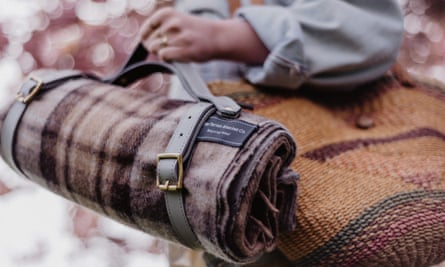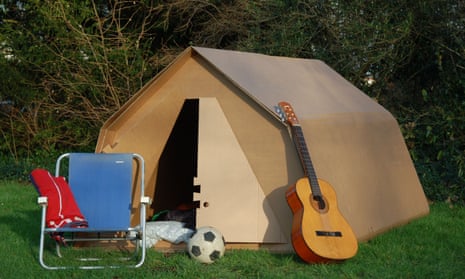Tents
It is estimated that 250,000 tents are abandoned at music festivals across the UK every year, amounting to 900 tonnes of plastic waste going into landfill. The Association of Independent Festivals (AIF) launched the Take Your Tent Home – Say No To Single Use campaign earlier this year, which followed the Drastic on Plastic initiative in 2018. As with other campaigns, such as Eco Action’s Love Your Tent and its #justtakeithome message, the aim is to reduce waste and remind festivalgoers that a tent is for life, not just for a weekend.
The Guardian’s product and service reviews are independent and are in no way influenced by any advertiser or commercial initiative. We will earn a commission from the retailer if you buy something through an affiliate link. Learn more.
A cheaper and greener alternative to buying a tent is to borrow one. Peer-to-peer lending sites, such as Fat Llama, include listings for a variety of camping equipment – currently there are four-person tents from £2 a day. Alternatively, give a new home to a discounted display or refurbished tent from Vango’s Camping Recycled site.
In it for the long haul? Plastic-free, 100% cotton canvas bell tents and tipis have better breathability and, being stronger, have a longer lifespan. It’s an investment – the four-metre-high 100% natural cotton canvas tent from Bell Tent Boutique is £379.99 – and some still come with a plastic groundsheet but after their final festival, in years to come, it will also decompose. And it will do sofaster than a man-made fabric tent.
Reel Tents has just launched a plastic-free tent made from water-resistant paperboard, using 70% recycled fibre content (one-person, £75, two-person, launching soon). The creators say they have been tested “in horrific weather conditions including snow, sleet, torrential rain, wind” and were “dry as a bone inside”. They are intended for several uses before being completely recyclable, and are relatively easy to transport (one metre flat-packed).
Going even further, Dutch-company Kartent is partnering with festivals around the world to pre-pitch tents made from 100% recyclable cardboard. According to the website, these “will stay dry with some showers for sure”. They are only currently available to book at festivals outside the UK.
Sleeping bags, and blankets

Down-filled products have long been rejected by ethically minded consumers. Although there are responsible down standards among some outdoor clothing and equipment brands, these vary between manufacturers, and there are still concerns about cruelty taking place. It is often difficult to tell whether down has come from a live-plucked bird or one force-fed for foie gras.
Synthetic fillings, on the other hand, are effectively plastics and petro-chemical industry products – so aren’t environmentally sound. However, sleeping bags filled with recycled synthetics, are a greener investment and easier to clean than down after damp festival conditions. The North Face Aleutian range (Trekinn, from £70) is made from 30% recycled materials and Nordisk’s super-lightweight Oscar +10 Degrees sleeping bag (Wiggle, £180) has 100%-recycled synthetic filling made from plastic bottles.
Blankets can be as cosy as a sleeping bag. The Tartan Blanket Company sells them from £28 and uses 70% recycled wool and 30% mixed fibres (meaning material that would otherwise end up in landfills). The exception is its 100% recycled wool Random Tartan blankets; each is created with off-cut wool from the mills.
Wipes
The Marine Conservation Society says it has seen a 400% increase in wet wipes found along the UK coastline in the past decade and these have also been an ingredient in fatbergs – one of which, discovered in a sewer in Sidmouth in Devon earlier this year, was longer than six double decker buses. Wet wipes were never destined for the loo, but even when they go in the bin, as they breakdown, most release microplastics, too.
Made for babies but perfect for eco-warriors who want to freshen up at festivals, Happy Planet’s biodegradable fragrance-free wipes (Ethical Superstore, £1.44) are created from plant cellulose fibres, purified water and apple extract, and are 100%-free from polyester and plastic. The company also donates 10% of its profits to charities working to remove plastic pollution from oceans.
Simple Biodegradable Cleansing Wipes (Superdrug, £1.59) are made from soft sustainably-sourced plant fibres and wood pulp. Or fruity Yes To’s wipes (£3.99) – which include soothing cucumber, rejuvenating grapefruit, and blemish-free tomato – are cruelty-free, paraben-free, and made from compostable Forest Stewardship Council-approved fabrics.
Wellies

Natural rubber seems like an obvious alternative to PVC or plastic-based wellington boots. Rubber wellies are more durable and when they are eventually discarded, they won’t be toxic when they decompose. However, it’s best to find out whether the material comes from sustainable sources or not before buying.
The sustainable plantations that Rockfish gets its rubber from are inspected regularly to ensure continuous replanting of trees. Handmade in Cornwall, they come in a range of colours and lengths (from £35). They are vegan-friendly, as is Evercreatures’ range which includes rainbow stripes and polka dot versions, handmade from sustainably sourced rubber, and sent in 100% recyclable packaging. And remember, #leavenotrace. Take it all home with you and donate unwanted items (including wellies, tents, clothing) to organisations such as Help Refugees and Gift Your Gear.
Glitter
This sparkly stuff may seem joyful and innocent but most of it contains microplastics that will eventually end up in waterways and oceans. Along with banning single-use plastics, such as straws, many festivals are now asking onsite stalls to only sell biodegradable glitter. In March this year, campaign group 38 Degrees launched a petition calling for the ban of conventional plastic glitter in the UK, and several retailers, including Aldi and Waitrose, have committed to scrapping it from products by 2020.
There are several companies selling biodegradable glitter, in a range of colours, blends and particle sizes. These are all made using Bioglitter, created from plant cellulose, sourced mainly from sustainably-farmed eucalyptus trees. Eco Glitter Fun (from £4 for single tins of loose glitter and £22 for a set of six) and EcoStardust (from £6 a bag)also use recyclable packaging and support environmental projects through donations. The latter also sells an all-natural vegan balm (£6) to use as a base for the glitter.
Looking for a holiday with a difference? Browse Guardian Holidays to see a range of fantastic trips
